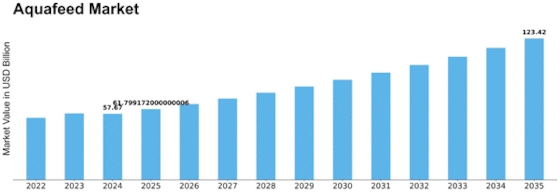Competitive Landscape of the Aquafeed Market: Key Players, Partnerships & Strategic Moves

The aquafeed market, as projected by MRFR, is not just expanding in size—it’s undergoing a technological revolution. With a market value of USD 57.67 billion in 2024 and projections soaring to USD 123.42 billion by 2035, the forecasted CAGR of 7.16% reflects a powerful shift fueled by innovation.
At the forefront of this transformation is precision feeding technology. Gone are the days of “one-size-fits-all” feed. Thanks to advanced analytics, automated feeders, and real-time monitoring, aquaculture producers can tailor feed both to species and life stage. This enables better nutrient utilization, reduces waste, and helps optimize feed-conversion ratios—delivering win-wins for growth and sustainability.
Equally important is the rise of functional feeds. Today’s aquafeed is not just about calories—it’s about health. Manufacturers are formulating feeds with probiotics, immune-enhancing additives, and stress-resilience compounds to strengthen fish and shellfish from within. These innovations are key as intensive farming practices increase, helping reduce disease risk and minimize reliance on antibiotics.
Another major innovation wave is in alternative ingredients. Plant-based proteins, insect meals, and other non-traditional nutrient sources are being developed and scaled. By reducing reliance on fish-based meals, feed producers are not only reducing environmental impact but also making feed more cost-efficient and sustainable in the long run.
On the production side, advanced processing technologies are improving feed quality. Extrusion, microencapsulation, and other manufacturing techniques are used to protect sensitive nutrients, stabilize feed, and improve digestibility. These enhancements help ensure that the feed’s nutritional profile remains intact until it reaches the aquatic species.
Geographically, Asia-Pacific is leading this innovation surge. MRFR’s data confirms that the region is the fastest-growing market for aquafeed, propelled by both massive aquaculture scale and strong investments in technology. In countries like China and India, local feed companies are rapidly adopting advanced formulations and production techniques to meet both growth and sustainability targets.
Major players in the aquafeed market—including Cargill, Nutreco, Skretting, BASF, ADM, and Evonik—are racing to lead in innovation. These firms are investing heavily in R&D, exploring novel ingredients and pushing the frontier of feed technology. Their strategies reflect a clear understanding: in tomorrow’s aquaculture sector, technological agility and sustainability will be just as critical as scale.
In summary, technology is reshaping the aquafeed market in profound ways. The MRFR forecast’s robust growth to 2035 is being underwritten not just by rising demand, but by smarter, more efficient, and more sustainable feed solutions. For stakeholders across the value chain—farmers, feed makers, investors—embracing this innovation wave is essential to stay competitive and future-ready.
Table of Contents
- Executive Summary
- Market Introduction
- Market Dynamics
- Market Segmentation
- Regional Analysis
- Competitive Landscape
- Future Outlook
- Conclusion
- Appendix
- Art
- Causes
- Crafts
- Dance
- Drinks
- Film
- Fitness
- Food
- الألعاب
- Gardening
- Health
- الرئيسية
- Literature
- Music
- Networking
- أخرى
- Party
- Religion
- Shopping
- Sports
- Theater
- Wellness


